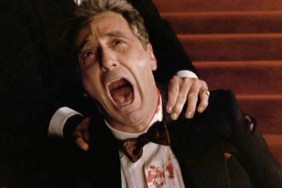With the announcement of the Producer’s Guild and Director’s Guild Awards, Alfonso Cuaron’s orbital blockbuster now seems positioned to win Best Picture at this year’s Oscars. Or maybe not. Conventional wisdom these days seems to suggest that the Academy prefers more “artistic” films like American Hustle and 12 Years a Slave over populist entertainment like Gravity.
After all, look at the history of the Oscars: Annie Hall won over Star Wars in 1978, Chariots of Fire creamed The Raiders of the Lost Ark in 1982, The Hurt Locker beat Avatar in 2010, The King’s Speech bested both Inception and Toy Story 3 in 2011.
The list goes on, but not for very long. Although the Academy does seem to trend towards smaller films with more artistic ambition than mainstream appeal lately, the history of the Academy Awards is filled with blockbuster Best Picture winners: Mrs. Miniver, Casablanca, From Here to Eternity, Oliver!, Patton, The French Connection, Schindler’s List, Braveheart and Gladiator, and those aren’t even the biggest hits of all.
In fact, if you adjust for inflation, you’ll discover that 20 of the Best Picture winners so far have smashed records, and still remain some of the biggest box office successes in history. So where does the idea that the Academy hates blockbusters come from?
Besides the above examples of popular films getting passed over for smaller critical successes, perhaps it stems from the fact that blockbusters have changed over the past few decades. The types of films that make enormous amounts of money now would have been trifling B-Movies throughout the bulk of the 20th Century. But many of the most financially successful Best Pictures are serious dramas that nevertheless drew massive crowds and, again if you adjust for inflation, actually made a lot more money than films like The Avengers, The Dark Knight or Pirates of the Caribbean.
It would seem then that audiences have changed, not the Academy. They still reward the same type of dramatically resonant motion pictures that, decades prior, audiences rewarded too. If the films had impressive visual effects, all the better, but simply having impressive visual effects – or taking an absurd concept like a man in a bat costume and somehow making it work – simply isn’t enough for the Oscars, and it never has been.
But Gravity, with a powerful leading performance from Sandra Bullock, and a story that seems simplistic but highlights the emotional drama of overcoming impossible odds, could very well be the film that once again bridges the gap between audience appreciation and Oscar gold. Both the Director’s Guild and the Producer’s Guild awarded the film their highest honors recently, and both wins are considered excellent prognosticators for which film will actually take home Best Picture in the end.
Will Gravity join the following films as one of the best blockbuster Best Pictures in history? Maybe, but it still didn’t make as much money as these twenty did.
The Top 20 Blockbuster Best Picture Winners:
Note: Figures were determined by domestic gross only, and were adjusted for inflation by Box Office Mojo.
William Bibbiani is the editor of CraveOnline’s Film Channel and co-host of The B-Movies Podcast. Follow him on Twitter at @WilliamBibbiani.
The Top 20 Blockbuster Best Picture Winners
Twenty Best Picture Oscar winners that prove the Academy loves blockbusters as much as anyone else.
-
20. Kramer vs. Kramer (1979)

Domestic Gross (Adjusted for Inflation): $359 million
Robert Benton's drama about a divorced man (Oscar-winner Dustin Hoffman) fighting for the custody of his son was a box office smash in 1980, and won the Best Picture Academy Award over All That Jazz, Apocalypse Now, Breaking Away and Norma Rae.
-
19. Rain Man (1988)

Domestic Gross (Adjusted): $361 million
Dustin Hoffman won his second Oscar for playing Tom Cruise's autistic brother in Barry Levinson's Rain Man, which won Best Picture over The Accidental Tourist, Dangerous Liaisons, Mississippi Burning and Working Girl.
-
18. Dances with Wolves (1990)

Domestic Gross (Adjusted): $364 million
Kevin Costner's sumptuous western, and directorial debut, won Best Picture over Awakenings, Ghost, The Godfather Part III and Martin Scorse's Goodfellas, a film many still think was robbed.
-
17. One Flew Over the Cuckoo's Nest (1975)

Domestic Gross (Adjusted): $448 million
It may not seem like blockbuster material now, but Milos Forman's mental institution drama won audience's hearts and Best Picture (and Best Director, Actor, Actress and Screenplay, one of only three films to do so) over Barry Lyndon, Dog Day Afternoon, Jaws and Nashville.
-
16. The Bridge on the River Kwai (1957)

Domestic Gross (Adjusted): $454 million
David Lean's explosive indictment of pride and war won Best Picture over Peyton Place, Sayonara, 12 Angry Men and Witness for the Prosecution.
-
15. The Best Years of Our Lives (1946)

Domestic Gross (Adjusted): $459 million
William Wyler's saga of soldiers returning home from World War II, damaged but unbroken, took home Best Picture over worthy contenders Henry V, It's a Wonderful Life, The Razor's Edge and The Yearling.
-
14. Rocky (1976)

Domestic Gross (Adjusted): $459 million
Americans celebrated their bicentennial by flocking to Rocky, the screenwriting debut of Sylvester Stallone, which won a Best Picture Oscar over an impressive group of nominees: All the President's Men, Bound for Glory, Network and Taxi Driver.
-
13. Lawrence of Arabia (1962)

Domestic Gross (Adjusted): $462 million
One of the most beloved and impressive epics of all time, David Lean's Lawrence of Arabia won Best Picture over The Longest Day, The Music Man, Mutiny on the Bounty and, most impressively, To Kill a Mockingbird.
-
12. West Side Story (1961)

Domestic Gross (Adjusted): $467 million
Robert Wise's handsome production of the musical West Side Story danced away with a Best Picture Oscar, over contenders Fanny, The Guns of Navarone, The Hustler and Judgment at Nuremberg.
-
11. The Greatest Show on Earth (1952)

Domestic Gross (Adjusted): $501 million
One of the most surprising (and some would say embarrassing) Best Picture wins in the Academy's history went to the enormously popular but now mostly forgotten The Greatest Show on Earth, which somehow beat High Noon, Ivanhoe, Moulin Rouge and The Quiet Man on Oscar night.
-
10. My Fair Lady (1964)

Domestic Gross (Adjusted): $501 million
George Cukor's beloved rendition of the musical My Fair Lady won Best Picture over Becket, Dr. Strangelove, Zorba the Greek and fellow blockbuster Mary Poppins (maybe it wasn't "practically perfect" after all).
-
9. The Lord of the Rings: The Return of the King (2003)

Domestic Gross (Adjusted): $514 million
The third installment of Peter Jackson's The Lord of the Rings swept the Oscars with 11 wins total, including Best Picture, making up for two previous years of snubs. It bested Lost in Translation, Master and Commander, Mystic River and Seabiscuit for the top prize.
-
8. Around the World in 80 Days (1956)

Domestic Gross (Adjusted): $539 million
Another of the Academy's biggest headscratchers, the enormously successful Around the World in 80 Days won the Best Picture Oscar over such incredible competition as Friendly Persuasion, Giant, The King and I and The Ten Commandments.
-
7. Forrest Gump (1994)

Domestic Gross (Adjusted): $655 million
Robert Zemeckis's special effects-driven saga of the mid-20th Century won Best Picture over the enormously popular indie Pulp Fiction, as well as Four Weddings and a Funeral, Quiz Show and the box office bomb-turned-American classic The Shawshank Redemption.
-
6. The Godfather (1972)

Domestic Gross (Adjusted): $659 million
The runaway financial success The Godfather also ran away with three Oscars, including a Best Picture win over Cabaret, Deliverance, The Emigrants and Sounder.
-
5. The Sting (1973)

Domestic Gross (Adjusted): $744 million
Paul Newman, Robert Redford and director George Roy Hill's first blockbuster, Butch Cassidy and the Sundance Kid, lost the Best Picture Oscar to Midnight Cowboy. Their second, The Sting, won over American Graffiti, Cries & Whispers, The Exorcist and A Touch of Class, and remains one of the biggest blockbusters of all time.
-
5. Ben-Hur (1959)

Domestic Gross (Adjusted): $818 million
William Wyler's blockbuster biblical epic won 11 Oscars in 1960 (a feat only duplicated twice, by #9 and #3 on our list), including Best Picture. It won over Anatomy of a Murder, The Diary of Anne Frank, The Nun's Story and Room at the Top.
-
3. Titanic (1997)

Domestic Gross (Adjusted): $1.13 billion
Formerly the most expensive movie of all time, and still one of the most popular, Titanic won 11 Academy Awards including Best Picture. It bested the much, much smaller-scale contenders As Good As It Gets, The Full Monty, Good Will Hunting and L.A. Confidential.
-
2. The Sound of Music (1965)

Domestic Gross (Adjusted): $1.18 billion
Robert Wise's wildly successful musical The Sound of Music remains one of the biggest blockbusters in history, and won Best Picture over Darling, Doctor Zhivago, Ship of Fools and A Thousand Clowns.
-
1. Gone with the Wind (1939)

Domestic Gross (Adjusted): $1.68 billion
Although some may sneer at the exaltation of the Confederate South (and the depiction of the various black characters), Gone with the Wind remains biggest domestic moneymaker of all time, earning Best Picture over a cavalcade of competition including Dark Victory, Goodbye, Mr. Chips, Love Affair, Mr. Smith Goes to Washington, Ninotchka, Of Mice and Men, Stagecoach, The Wizard of Oz (!) and Wuthering Heights.









